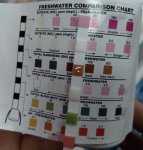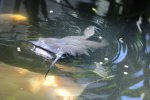Found article in MI Gardner thought you might like to read. Regarding chlorine and chloramine.
By Rick Bartel http://pondplace.com/dangersofchlorine.aspx
|
| Concentrated levels of chlorine kill fish and other aquatic life-forms. |
Pond owners and service providers have argued the validity of watching the level of
chlorine in
ponds and whether those chlorine levels are harmful to the aquatic life in
a pond.
Some report performing partial water changes without treating the tap water to remove chlorine. This devastating error can create untold issues.
Even when
koi and other pond fish show no apparent ill effects from untreated water, it doesn't
mean the chlorine isn't stressing or harming them. The amount of harmful damage
depends on many factors.
To clear the air a bit, here are some fundamental scientific facts about chlorine and
pond fish, dragonfly larvae, frogs, tadpoles and other aquatic life often present in pond systems:
- Concentrated levels of chlorine kill fish and other aquatic life-forms.
- Chlorine is an oxidizer, which removes the necessary slime coat from koi and other pond fish, causing stress and stress-related illnesses.
- Chlorine damages the gill structure in koi and other pond fish, causing serious long-term issues and making it difficult for the fish to breath.
- As the pond's pH levels go down, chlorine becomes more toxic.
- The presence of phenols, a toxic organic chemical found in some types of organic wastes, can combine with chlorine to become extremely toxic.
- Chlorine is relatively unstable in water, escaping to the atmosphere on its own. Water left sitting with adequate water circulation will be chlorine-free 24 hours or less.
- Sodium thiosulfate easily neutralizes chlorine.
- When exposed to high levels of chlorine, koi and other pond fish show signs of irritation, such as swimming erratically or attempting to leave the water.
At lower levels, chlorine is not necessarily life-threatening to koi and other pond fish, but it still can harm them. Affected fish might exhibit fast gill beats and gasp at the water surface to get enough oxygen into their tissues. These symptoms easily can be mistaken for low-oxygen problems, gill parasites or another gill disease, when raw tap water might be to blame.
Here are example chlorine levels and what they can do to pond fish:
.006 mg/L will kill fish fry in about two days.
.003 mg/L will kill insect larvae, such as dragonflies.
.002 mg/L will fatally damage the sensitive skin on tadpoles, frogs, salamanders and other amphibians.
.01 mg/L is the maximum level that experts say adult fish can tolerate.
.25 mg/L is the level at which only the hardiest koi or other pond fish can survive.
.37 mg/L is the level at which all pond fish will die.
If you suspect chlorine damage to pond fish, increase aeration in the pond for a few days. This improves their chances of recovery.
The answer and proper solution to this issue is to use a water treatment chemical. They typically cost pennies per use and safely remove chlorine and chloramines. Read the label to ensure you purchase and use the right product for your needs.
Note:
One problem with water treatment facilities using chlorine to treat water is that it breaks down relatively quickly. Another concern with the use of chlorine is that it can combine with certain organics (that might be present in your water) forming trihalomethanes, a family of carcinogens.
Consequently, many water companies have switched from using chlorine to using chloramine. Chloramine is a compound containing both chlorine and ammonia. It is much more stable than chlorine, but it poses a significant headache for pond enthusiasts. Chlorine-neutralizing chemicals, such as sodium thiosulfate, only neutralize the chlorine portion of the chloramine, neglecting an even bigger problem: deadly ammonia. The consequences can be devastating to koi and other pond fish. A pond's biological filter eventually will convert the ammonia to nitrate, but the time it takes might be longer than the fish can tolerate. Also, the initial presence of the chlorine might have irreparably damaged to the biological filter, rendering it useless



